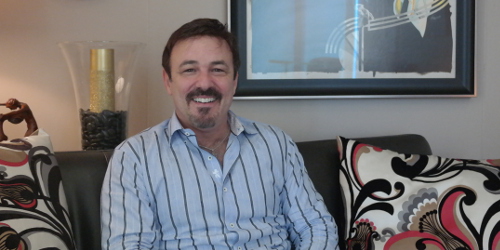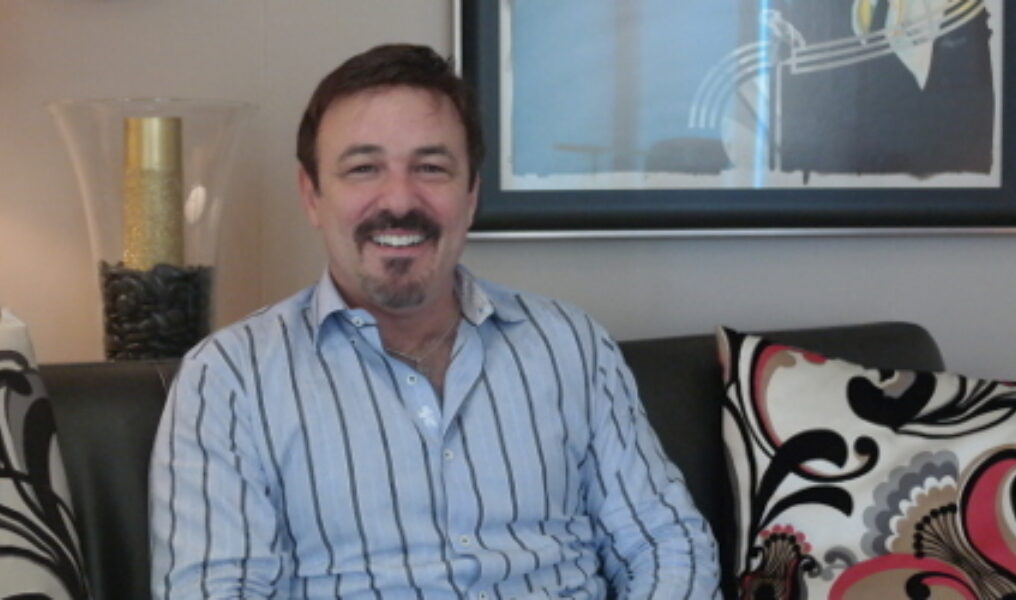BY AJ TRAGER

Joe Kort, Ph.D., LMSW, works as a sexual therapist in Royal Oak. He is known in the therapist community for his work with sex therapy and sexual identity issues, including out-of-control sexual behavior; responsible nonmonogamy/ monogamy; childhood sexual, physical and emotional abuse; mixed-orientation marriages; coming out; and depression and anxiety. Kort began his practice in 1985 and has published multiple books on gay love and has been featured in The Huffington Post. BTL photo: AJ Trager
ROYAL OAK – In her latest book, "Understanding Patients' Sexual Problems: A Reference Handbook For Healthcare Professionals," Grace Blodgett, Ph.D. begins her preface by saying, "Healthcare professionals demonstrate varying levels of knowledge, understanding, experience and perceptions about the topic of sexuality in the patient care arena. Unfortunately, a great deal of the information about sexuality they bring to the clinical arena is often full of misconceptions and insecurities about their own sexuality, as well as that of the patients for whom they provide care."
Sexual Therapy is often described as the treatment of sexual dysfunction when there is no medical reason or complement to medical treatment. Individuals or couples who seek out a sexual therapist often ask about premature ejaculation, erectile dysfunction, low libido, unwanted sexual fetishes, sexual addiction, painful sex, lack of sexual confidence and a variety of other issues that can affect the satisfaction or enjoyment of one's sexual experiences.
However, like many specialty arenas in the medical field, sexual therapy is taught within the confines of the binary, cisgender heterosexual health model. Many therapists are not often educated in LGBT identities and the specific disparities that factor into the LGBT experience. Sexual therapy is gaining popularity and more and more mental health professionals are choosing to pursue sexual therapy; however, there is still a lack of sexual therapists focusing on LGBT identities.
"Sexual orientation is considered by most researchers to be fixed through life, and efforts to change one's sexual orientation usually fail," Blodgett writes at the beginning of Chapter 2: Sexual Behaviors And Techniques According To A Person's Sexual Orientation. "However, sexuality is considered to be on a continuum, and sexual expression changes over time."
Joe Kort, Ph.D., LMSW, works as a sexual therapist in Royal Oak. He appears on the first page of Google search results when typing in "Sexual Therapy LGBT" and is known in the therapist community for his work with sex therapy and sexual identity issues, including out-of-control sexual behavior; responsible non-monogamy/monogamy; childhood sexual, physical and emotional abuse; mixed-orientation marriages; coming out; and depression and anxiety. Kort began his practice in 1985 and has published multiple books on gay love and has been featured in The Huffington Post.
"As a gay person and having to examine my own sexuality and the things I like, the things I don't like, negotiate with people (whereas straight people don't need to do that necessarily), but as a gay person – even lesbian – you sort of have to find your own rhythm. A lot of therapists early on, maybe 30 years ago, would see gays, lesbians and bisexuals as sexual. For them, they didn't want to deal with the sexuality or they didn't want to understand it, so clients would come to me and say, 'When we started talking about sex, I couldn't see my therapist anymore because he or she couldn't help me.' And that got me more and more interested in talking about and dealing with it," Kort explained.
Kort finds it more comfortable to introduce non-heterosexist types of sexuality with gays and lesbians than he does with his heterosexual clients, partially due to how the LGBT community has sex. There are many different ways to be physically intimate with a partner and Kort is critical of the ideology that says the only way to have sex is through penetration or vaginal intercourse.
"There are other ways of being sexual than just this vaginal intercourse; there's role play and fantasy. For gay and lesbian couples, it's already on the table. They're already thinking and talking like that because we're forced to have to look outside the box," he explained. "We don't fit into that heterosexist model so we have to find our own way and often we find it through ourselves."
Kort is skeptical of many sexual therapists who list themselves as being able to assist LGBT clients on PsychologyToday, a leading resource for people to find a local therapist, or in this case, a sexual therapist. He believes many of them are "gay friendly" and not necessarily "gay informed." And that bothers him.
"They'll say often that a couple is a couple. And that's bullshit. Two men are completely different than two women who are completely different than a straight couple," Kort said. "While there are lots of overlap, they are ignoring and negating the fact that there are differences. They aren't identifying for the couple when they are two men what the special issues are that they face that two women don't face. And the dynamics are so different. So it bothers me that they don't feel like there is something to dig into more. It's like any cultural competency."
Michigan does not require schools to teach sexuality education; however, the state does require schools to provide sexually transmitted disease and HIV/AIDS education. This policy allows for some districts to educate LGBT and heterosexual youth with abstinence only programs or use sexual education language that stands silent on LGBT youth sexual expression, often times continuing the narrative that being LGBT is less than human.
"It's as if we (LGBT) are invisible, like we don't exist," Kort said. "The reality is it isn't necessarily homophobia but erotophobia. It's the fear and disgust of sex. And just disinterest in learning about it. I think it drives a lot of what our culture is all about. We say we're sexual but then when we talk about sex, practicing it and doing it, people get very judgmental and moralistic. I think that's what a lot of the religious hate is all about: the fear of sex because it's complicated, messy, smelly, and that's not what we want to talk about."
When discussing sexual activities, Kort likes to remind clients, particularly heterosexual men who approach him with their love of anal play, that body parts do not have a sexual orientation. He says lots of LGBT couples do not have sex and that the lack of sexual contact does not make them straight. It's attraction. Some people regularly have physical intimacy and others just don't.
"The healthcare environment that exists in America today is such that honest, direct and healthy discussions between healthcare professionals and patients about patient sexuality issues are extremely difficult at best," Blodgett writes. "This difficulty is the result of social beliefs that a person's sexuality is a private issue as well as the lack of education among healthcare professionals about sexuality and how to discuss it with patients."
These difficulties are a result of persistent influences from history, culture, religion and even turmoil that influence all aspects of healthcare and interpersonal conversations between people.
Thanks to the internet the world knows so much more about what people are doing, what they're thinking and wanting, Kort said. And still though the sex therapy field is small — growing, but it's small. Kort sees an obvious need for more sexual therapists and more sexual therapists that focus on serving the LGBT community. He says most therapists haven't dealt with their own sex lives and that they don't know how or where to talk about sexual health with their clients.
"I think because I was gay I was forced to talk about it. I think LGBT people were forced to talk about it because it's unnatural for us to do it the way we are taught," Kort said.
"Understanding Patients' Sexual Problems" is currently available on Amazon and discusses a variety of topics for healthcare professionals to better understand how sexual health education for medical and nursing professionals is inadequate, yet critical in understanding LGBT patients' needs and problems; early problem recognition and stigma-free, therapeutic and effective intervention; what conversations LGBT patients should have with their healthcare professionals; and treating patients of all ages and sexual orientations with respect inside and outside the healthcare arena.










